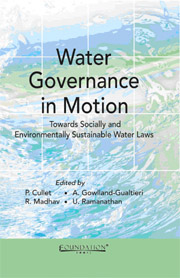Book contents
- Frontmatter
- Contents
- Acknowledgments
- Contributor Biographies
- Introduction
- I Water Law, Policy and Institutional Reforms in India
- 1 Water and Questions of Law: An Overview
- 2 Water Law – Evolving Regulatory Framework
- 3 Discourses in Water and Water Reform in Western India
- 4 The Slow Road to the Private: A Case Study of Neoliberal Water Reforms In Chennai
- II Ongoing Irrigation and Ground Water Reforms in India
- III Perspectives on Privatisation
- IV Environment and Human Rights
- V Comparative Perspectives on Reforms
- Bibliography
3 - Discourses in Water and Water Reform in Western India
from I - Water Law, Policy and Institutional Reforms in India
Published online by Cambridge University Press: 26 October 2011
- Frontmatter
- Contents
- Acknowledgments
- Contributor Biographies
- Introduction
- I Water Law, Policy and Institutional Reforms in India
- 1 Water and Questions of Law: An Overview
- 2 Water Law – Evolving Regulatory Framework
- 3 Discourses in Water and Water Reform in Western India
- 4 The Slow Road to the Private: A Case Study of Neoliberal Water Reforms In Chennai
- II Ongoing Irrigation and Ground Water Reforms in India
- III Perspectives on Privatisation
- IV Environment and Human Rights
- V Comparative Perspectives on Reforms
- Bibliography
Summary
Introduction
Water policies at all levels are shaped by a variety of actors – governments, interest groups within nations, social movements, international institutions such as the World Bank, water multinational companies, and so on. But one often finds common threads in the views and actions of actors at different levels (for instance, in the kind of water reforms that have been advocated), which indicates the presence of dominant discourses that shape opinions and provide legitimacy to particular kinds of policies. This chapter looks at how two discourses – the Global Environmental Management (GEM) discourse and the rights-based discourse – have shaped water reforms in Maharashtra, a state in western India. Since the relationship between knowledge and policy is complex, the aim is not to show a precise relationship between discourses and policies at different levels (international, national, and sub-national). Instead, this chapter emphasises the commonalities in the discussions around one aspect of water (delivery of water services) at different levels. As Adger and others point out in their analysis of the environmental discourses associated with deforestation, desertification, biodiversity use, and climate change, such an exercise is useful to show how adopting particular languages and rhetoric constrains the solutions proposed for specific issues.
The arena of delivery of water services is particularly interesting to study from this point of view because it has seen changing trends in recent times, which are due, in no small measure, to the influence of different discourses in water.
- Type
- Chapter
- Information
- Water Governance in MotionTowards Socially and Environmentally Sustainable Water Laws, pp. 53 - 79Publisher: Foundation BooksPrint publication year: 2010

